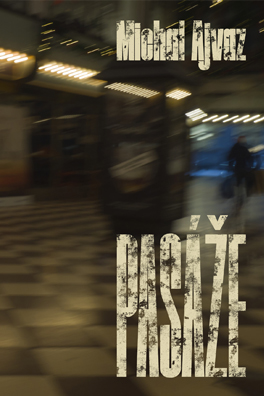
Original title: Pasáže
Genre: novel
Publisher:
Druhé město, 2024
ISBN: 978-80-7227-900-5
Pages: 456
Awards:
longlisted for the Magnesia Litera – Luxor Litera for prose (2025)
Rights sold to:
Poland (Stara Szkoła), Germany (Allee Verlag)
Passages, Michal Ajvaz’s ninth work of prose, fits within a single forever-flowing narrative – for this novel is joined to the author’s previous eight by passages. We encounter other worlds shown to inhabitants of the known world in bizarre signs and events that flow unbound by the pragmatic logic of our civilization; an intoxicating journey southwards; the chaining together and interweaving of stories; strange objects whose apparent stolidity determines the fates of characters, although ‘chance is but a magic mirror revealing of our hidden face’.
The passages in this grand story are detectable – by a long look from a window at the branches of a tree, for instance. The awestruck eye espies a living room with a desk bearing a half-read book that contains a story about the writing of novels featuring stories about intelligent machines that write poetry… Where do their images and words come from? This is one of the themes of the thought and writing (thought by writing?) of Michal Ajvaz. There is no Big Answer here, no transcendental touch from God’s finger. In Ajvaz’s literary and philosophical universe, objects emerge from a void that is the source of all art and being.
"Nothingness as the source of stories, the search for the origin of inspiration, literature and philosophy as a mutual mirroring, a double helix of paths to a common goal... In the novel Passages, the author returns to the themes of his previous books, but it is not a mechanical repetition. It is a development, a continuation of the journey through the labyrinth of the human mind, which remains unique in Czech literature."
Statement by the Magnesia Litera jury
"Passages is anything but simple. In the spirit of Umberto Eco’s theory, the reader and the author have to enter into a kind of imaginary agreement: to accept the narrative style and to believe in the things, coincidences and paths that the writer presents. Then Michal Ajvaz, the 74-year-old winner of the State Prize for Literature, repays this trust with a narrative that holds surprises on every page.
Surprise combined with mystery and wonder are the main features of his writing. You can’t even expect in the slightest to guess what is about to happen on the next page. Even if you did, this would happen again right away or in a completely different way.
(…)
But it also touches on current issues relating to the very nature of humanity. Specifically, the fear of machines and artificial intelligence taking over what is often considered most intrinsic to humans: storytelling.
(…)
The novelist also touches on the topic of the authorship of works, the role of pride and modesty in creative artists and different approaches to the creative process. As always, a subtle, unobtrusive humour is ever present, which manages to place even the deepest and most complicated ideas within appropriate bounds of absurdity.
(…)
Mysterious objects, the settings of arcades, cafes, foreign cities and coincidences that lead to further coincidences are all ingredients that the writer masterfully uses to lead the reader to reflect on the nature and meaning of art in our lives, as well as on the basics of human communication, understanding others and the ability to listen to stories experienced by someone other than ourselves.
The book itself, 449 pages long, is an invitation to experience a fruitful timelessness. One can wander long enough through the passages of Ajvaz’s mind, looking at the showcases of different layers of narrative. Stopping at them and crystallizing one’s thoughts on the reflections of what one finds there. All you need is time – an undisturbed concentration on the text, which in return gives you a sense of wonder and delight at the possibilities of the imagination, at the many mysteries that one can unravel together with the author, or at least where you can participate in the process.This fiction writer, so exceptionally profound and readable in Czech literature, proves that stories and their telling through books are also an act of courage. The courage to create a magnificent and fragile construction, which can fall apart in the absence of timelessness.
In today’s age of fragmented attention, Michal Ajvaz’s books are proof that reading is one of the few possible cures for the anxieties arising from this condition. Surrendering oneself to five hundred pages of the novel’s engrossing stream of narrative, digressions, notes, images and words that emerge from them has an incredibly liberating effect.
It’s a journey from everything short, fast and instant – social media posts, rants and video clips – to something we often think we can no longer afford. Yet all we have to do is let ourselves get lost in Passages one early winter evening."
Markéta Pilátová, Aktuálně